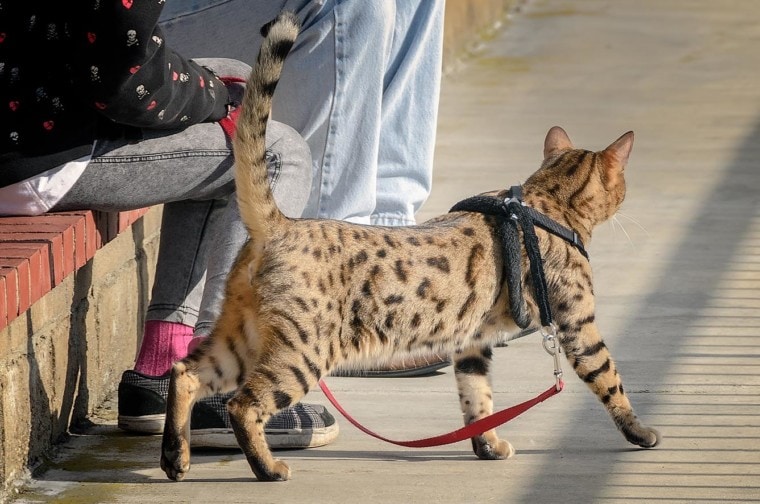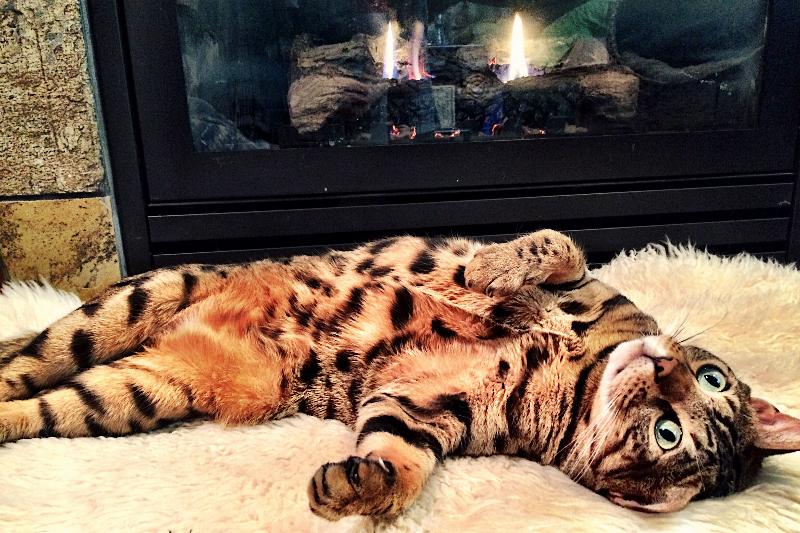
Click Below to Skip Ahead
Despite their wild cat appearance, Cheetoh cats are eight generations removed from their wild ancestors. These large cats are energetic, sociable individuals that get along well with everyone, human and animal.
Breed Overview
Height:
12” – 18”
Weight:
12 – 25 lbs.
Lifespan:
10 – 15 years
Colors:
Brown, seal lynx point, sepia, mink, silver
Suitable for:
Active households, attentive homes with children and pets
Temperament:
Intelligent, friendly, energetic, curious, social, affectionate
The breed makes a great companion pet because they are happy to spend their days lounging in your lap. The Cheetoh is a relatively new breed and weighs more than 20 pounds, making them one of the largest and rarest cat breeds in existence.
Cheetoh Cat Characteristics
Cheetoh Kittens
Cheetoh kittens are rare and difficult to find. If you find one in a breeder, chances are that they will be on the expensive side. Finding a Cheetoh cat in a shelter seems like a challenging task, but you can always ask and you might be surprised.
Cheetoh cats tend to be very energetic and affectionate. Their energy levels and high intelligence make them easily trainable. Keep reading their full care guide to know what type of food, exercise, and grooming they need to grow into happy and healthy cats.
Temperament & Intelligence of the Cheetoh Cat
Cheetoh cats are high-energy, talkative felines. They are intelligent and require plenty of attention and mental stimulation. If you are adopting a Cheetoh cat, you should be prepared to fill your home with perches, scratching posts, climbing trees, and toys to keep this cat busy. Cheetohs need many outlets for their energy and opportunities to release it in a healthy manner.
While they’re active, Cheetohs are also sweet and gentle. They love to go for leash walks and can easily be trained to do all sorts of tricks.

Are These Cats Good for Families? 👪
Yes! Cheetoh cats make fantastic family pets, as long as someone is home most of the time or the cat has another pet as a companion. This breed doesn’t like to be alone, but they can form strong bonds with multiple family members.
Does This Breed Get Along With Other Pets?
Cheetohs get along great with other cats and dogs. Some have even been known to make friends with horses and other livestock.
Small animals, like guinea pigs, hamsters, and rabbits, should not be kept within reach of a Cheetoh cat. This breed is large and has a strong prey drive.
Things to Know When Owning a Cheetoh Cat
Food & Diet Requirements 
Cheetoh cats don’t have any special dietary requirements. They do well on high-quality cat food like any other breed. Their size, however, means they will require a higher volume of food to support their energy levels.
Exercise 🐈
Cheetoh cats enjoy running, jumping, pouncing, and playing. They are high-energy and require plenty of exercise. These kitties need to be kept active in order to avoid boredom and destructive behavior. This is not the right breed for you if you want a cat that is independent and doesn’t require much one-on-one attention.
Training 🧶
If you’re looking for a cat that can be easily trained to do anything that you want, a Cheetoh is a great choice! The Cheetoh is one of the easiest feline breeds to train and is almost dog-like in their behavior. They can learn to walk on a leash or do tricks. Trick training is a fantastic way to enhance playtime and burn off extra energy.
Grooming ✂️
Cheetohs are short-haired cats. While they do require regular brushing to keep their coat healthy, they don’t require as much grooming as long-haired cats. They do shed, but this can be kept to a minimum with daily brushing.
Overall, the Cheetoh cat is low maintenance with regard to grooming. They don’t need a strict grooming schedule and will be happy with regular brushing.
Health and Conditions 🏥
There isn’t much health data for Cheetoh cats, as the breed is relatively new. But we can get an idea of what diseases the breed is prone to by looking at the Bengal and Ocicat parent breeds. Cheetoh cats intended for breeding should be tested for these genetic conditions to ensure that they don’t carry disease-causing genes.
Male vs. Female
Both male and female Cheetohs that are not fixed will exhibit typical behaviors associated with finding a mate. For males, this means roaming and marking behavior. Females can become irritable and demanding when they are in heat.
For Cheetohs that have been spayed and neutered, there are no noticeable behavior differences between the two sexes. The biggest difference is a physical one: Males are slightly larger in size than females and can weigh up to 25 pounds.
3 Little-Known Facts About the Cheetoh Cat
Cheetoh cats are social creatures that always like to be around others. They love both people and other pets, but they do not enjoy being left alone.
2. Cheetoh cats are descended from Bengal cats and Ocicats
Cheetohs were first bred in 2003 in an effort to create a wild-looking domestic cat. They have no wild blood but were bred by crossing an Ocicat with a Bengal. Interestingly, Cheetohs are larger than both of their parent breeds.
3. Cheetohs are considered an experimental breed
The United Feline Organization recognized the Cheetoh cat as a distinct breed in 2004. The International Cat Association, however, lists them as an experimental breed due to how new they are. Cheetoh cats are now found in Australia, New Zealand, the United States, and Canada.
Conclusion
Cheetoh cats are a rare, sought-after breed due to their endearing personalities and trainability. For potential owners who want an interactive feline, Cheetohs are a fantastic fit. They are expensive and difficult to find but relatively easy to care for. They have long lifespans and make loving companions. There is no doubt that owning a Cheetoh cat is a rewarding experience.
Featured Image Credit: Lux Blue, Shutterstock






